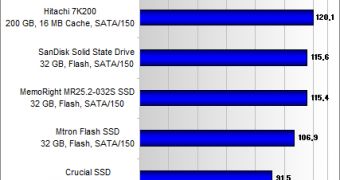Since Solid State Drives (SSDs) tend to become the future in mobile computing, their power efficiency is a concerning issue for consumers, as they want their devices to feature extended battery life. SSDs have been said to consume far less energy than their moving-parts-laden cousins, but a recent experiment conducted by Tom's Hardware shows quite the opposite. The truth is that SSDs need more power than HDDs, meaning that they shorten battery life.
According to Tom's Hardware, the answer is a simple one. Hard disk drives are believed to require more energy only because paper calculations show such a state of facts. The average energy consumption of a hard disk drive is a low one, and it rarely goes to high values. HDDs do require a greater amount of energy when accessing random data, but even then, the values don't rise too much too often.
The problem faced by SSDs comes from the fact that they are set to use only two modes for power saving, and these are "on" and "off". This means that the hard drive will probably be using the "on" mode pretty much all the time when you access it, which makes the energy consumption reach high levels.
Since the manufacturers have not tried to focus on other power saving solutions, it seems that this problem will persist quite a while on the SSD market. That means that we should perhaps wait for them to make a move in this direction before acquiring a new SSD for our notebooks.
According to Tom's Hardware, the benchmarking tests were conducted on the same laptop. The power consumption of the 7200 RPM hard disk drive used for testing is also suggested to be higher than that of a 5400 RPM model, but the above screenshot says a lot, too.

 14 DAY TRIAL //
14 DAY TRIAL //